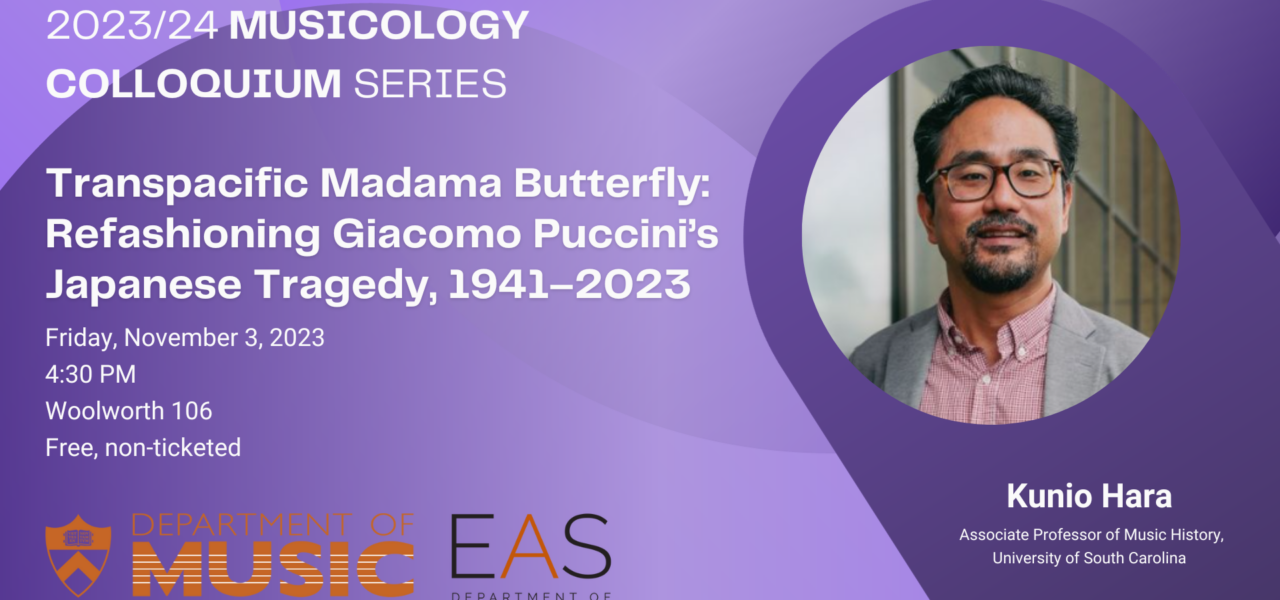Please consult our COVID-19 policies and resources for guidance on attending public performances.

Musicology Colloquium: Kunio Hara
Presented by Musicology Colloquium Series, Princeton University Music Department, Department of East Asian Studies
date & time
Fri, Nov 3, 2023
4:30 pm - 6:30 pm
ticketing
Free, non-ticketed
- This event has passed.

Kunio Hara is Associate Professor of Music History at the University of South Carolina. His research interests include operas of Giacomo Puccini, musical representations of nostalgia, animated films of Studio Ghibli, and music in postwar Japan. He has published articles on Puccini’s operas as well as on Tōru Takemitsu’s instrumental music in journals including Journal of the Society of American Music, Music & Politics, Studi pucciniani, and Music and the Moving Image. His most recent essay, “The Racial Politics of Madama Butterfly and Turandot,” is included in Puccini in Context edited by Alexandra Wilson and published by Cambridge University Press. He has given public talks on Madama Butterfly for the Metropolitan Opera, the Boston Lyric Opera, the Atlanta Opera, and Portland Opera. He is also the author of Joe Hisaishi’s Soundtrack for “My Neighbor Totoro” published by Bloomsbury Academic as part of their 33 1/3 Japan series.
ABSTRACT:
Transpacific Madama Butterfly: Refashioning Giacomo Puccini’s Japanese Tragedy, 1941–2023
In the wake of the sharp rise in anti-Asian violence during the COVID-19 pandemic, Giacomo Puccini’s opera Madama Butterfly has attracted increased scrutiny for its negative impact on the lives of people of various East Asian ancestry. In response to this crisis, a cohort of Asian American musicians, directors, and advocates have organized public events to discuss and to reimagine the opera in ways that reflect their concerns as artists and citizens. Conversing with these Asian and Asian American artists, however, suggests an unsettling dearth of accessible writings about the long history of Asian engagement with Madama Butterfly. Indeed, while existing musicological critiques of the opera eloquently articulate the insidious cultural work of Puccini’s Madama Butterfly, they frequently overlook the contributions that performers, creative artists, and audience members of Asian descent have made in refining, promoting, and, at times, resisting Madama Butterfly.
My current research project, tentatively titled “Transpacific Madama Butterfly,” sets out to fill this gap in knowledge about the performance and reception history of the opera by focusing on the activities of individuals of Asian descent who engaged with the opera. In adopting the critical framework of the “transpacific” promoted by scholars within the field of Asian American Studies such as Janet Hoskins and Tuong Thanh Nguyen (2016), and Yunte Huang (2008), I aim to illustrate the flow of ideas, cultural practices, objects, and people that constitute the history of the opera. The scope and aim of the project complement the body of scholarship by Arthur Groos (2023) that examines the early reception of the opera in Japan through the mid-twentieth century as well as works by Mari Yoshihara (2007) that historically contextualizes the participation of East Asian musicians in the artistic realm of Wester classical music. For the presentation, I propose to examine a handful of historic as well as current productions, ranging from Yoshio Aoyama’s 1958 Metropolitan production to Phil Chan and Nina Yoshida Nelsen’s 2023 Boston Lyric Opera production, putting them into conversation with each other to discern any recurring patterns as well as to trace the development in the critical discourse surrounding the work. Ultimately, I wish to expand the ongoing scholarly discourse on Puccini’s Madama Butterfly by reframing it around the lived experiences of the people of Asian descent and to equip current and future practicing musicians and advocates with historical knowledge that could inform their critical engagements with the opera.
This colloquium is presented in collaboration with the Princeton Department of East Asian Studies.

